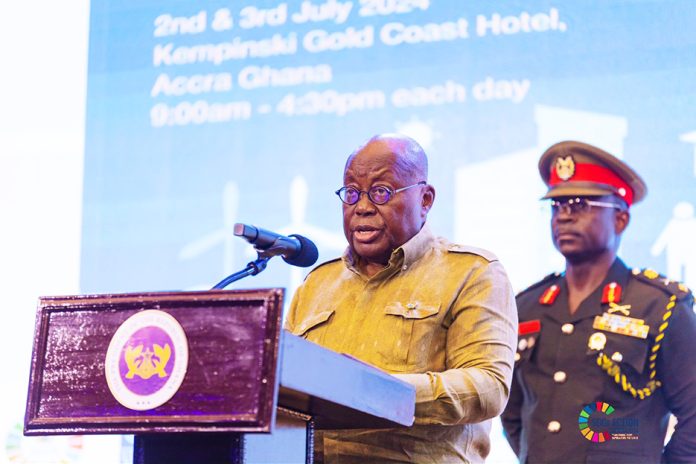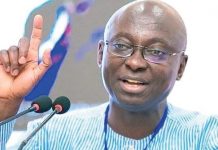The President, Nana Addo Dankwa Akufo-Addo, has presented a four-point agenda to accelerate the implementation of the Sustainable Development Goals (SDGs). The four-point agenda included unlocking finances, public-private partnerships and building resilient infrastructure.
President Akufo-Addo outlined the agenda on Tuesday, July 2, 2024 at the opening ceremony of the SDGs Action Summit 2024, currently ongoing in Accra, on the theme: “From Mid-point to Success: Recommitting, Scaling up and Accelerating action on the SDGs.”
The President proposed that the implementation of the SDGs could be accelerated if there was a focus on unlocking financing.
According to the President, Africa is committed to the implementation of the SDGs, but the persistent financing gap was the bottleneck derailing the efforts.
He indicated that the continent required an additional $1.3 trillion annually to achieve the SDGs by 2030, citing estimates from the United Nations Economic Commission for Africa (UNECA).
The president recommended measures to address the challenges, including enhanced domestic resource mobilisation through improved tax collection, combating illicit financial flows and promoting transparency in public financial management.
He mentioned that another way to address the financing challenge was through public-private partnerships (PPPs). He explained that such PPPs would bridge the financing gap. The President also advocated creating an enabling environment through smart policies to attract private capital for critical infrastructure projects, healthcare, education and renewable energy initiatives.
HUMAN CAPITAL
On his second point of the four, President Akufo-Addo proposed prioritising human capital development in Africa. He emphasised Africa’s unique position, considering that 60% of its population was under the age of 25, adding that there was a need to invest strategically in the youth.
He cited increasing access to quality education, focusing on Science, Technology, Engineering and Mathematics (STEM).
According to the President, the significance of vocational training and skill development to equip the youth cannot be overemphasised, as they afford the practical skills needed in various sectors.
INNOVATION
The third point on the agenda that President Akufo-Addo mentioned was driving innovation in critical sectors of Africa’s economy.
Here, he highlighted the potential of financial integration across borders and renewable energy technologies to scale up and accelerate SDG action.
President Akufo-Addo envisioned a future where capital flows seamlessly across borders, businesses access broader markets and communities gain greater access to financial services, promoting inclusive and sustainable development.
RESILIENT INFRASTRUCTURE
On his last point, President Akufo-Addo proposes a focus on building resilient infrastructure to withstand global shocks and stresses.
Highlighting the vulnerabilities exposed by the COVID-19 pandemic and geopolitical tensions, President Akufo-Addo called for the development of reliable infrastructure to support diverse economic activities.
He also stressed the importance of providing smart insurance schemes for financial protection to vulnerable communities and businesses.
He said that, “together, we can build a sustainable and prosperous Africa that leaves no one behind” and called for collective efforts to achieve the transformative change needed to meet the SDGs by 2030.
In a welcome address, the Presidential Advisor on the SDGs, Dr. Eugene Owusu, highlighted the challenges facing the implementation of the SDGs, including the deficit in financing.
“All these challenges are reinforcing deprivation across the continent, exacerbating poverty, fueling instability, widening inequalities in countries and sharply contributing to the deterioration of our planet,” he said.









